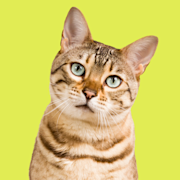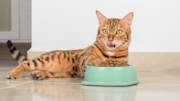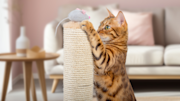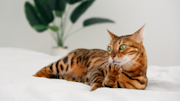Pets and children: ideas to create a safe and happy home for everyone

Bengal cat insurance
Discover why Bengal cats make great pets and why pet insurance is a smart way to protect their health

Bengal cat breed overview
Bengal cats are known for their leopard-like appearance and energetic personalities. These adventurous and intelligent cats love to explore, play and interact with their surroundings. Bengals thrive in active households and can form strong bonds with their owners.
Bengal cat key facts
Lifespan
12 to 16 years.
Height
25 to 30 cm.
Weight
3.5 to 7 kg.
Coat
Short coat in 2 patterns and 3 colours.
Grooming
Brush weekly.
Temperament
Affectionate, curious and energetic.
Learn more about Bengal cats

They love water
Bengals descend from the Asian leopard cat, a wild ancestor that loved water. This trait has carried through generations, making Bengals unusually fond of water unlike most other domestic cats.

They have a wild history
Bengals were originally bred from domestic cats and Asian leopard cats. Their spotted or marbled coats give them a wild appearance.

They are energetic
Bengal cats are highly active and playful. They need plenty of stimulation like climbing trees, puzzle toys, or interactive play to stay happy and healthy.
Common health conditions in Bengal cats
Bengal cats can live long and happy lives, but they are prone to several health conditions. Here are six to be aware of:
Hypertrophic cardiomyopathy
A heart condition where the walls of the heart thicken, making it harder to pump blood. It can lead to fatigue, breathing issues, or sudden collapse. Regular vet checkups are key to early detection.
Progressive retinal atrophy
A genetic eye disease that causes gradual vision loss and eventual blindness. It usually starts with night blindness and worsens over time. There’s no treatment, but genetic testing can help breeders avoid passing it on.
Patellar luxation
Patellar luxation is a condition where the kneecap (patella) slips out of its normal position. Severity can range from mild to severe, and in some cases, surgery may be recommended to correct the problem and prevent arthritis.
Feline infectious peritonitis
Feline infectious peritonitis is a serious, often fatal disease caused by a mutation of the feline coronavirus. Once considered untreatable, new antiviral treatments are emerging, but early diagnosis and veterinary care are important.
Polycystic kidney disease
An inherited condition where cysts develop in the kidneys, potentially leading to kidney failure. Symptoms include increased thirst and weight loss. While there’s no cure, early diagnosis and diet changes can slow the progression of the disease.
Hip dysplasia
A joint issue where the hip doesn’t form properly, causing pain and stiffness. Cats might limp or avoid jumping. It’s more common in larger breeds and can be managed with weight control, physiotherapy, or surgery in severe cases.
Care tips for owners
Watch their weight
Bengals are muscular and active, but can gain weight if overfed. Stick to portioned meals.
Play daily
They’re energetic and love to climb. Offer climbing trees, interactive toys, and daily play sessions.
Brush weekly
Their short, dense coat is easy to care for, but a weekly brush keeps it healthy and shiny.
Check their ears
Look for signs of wax or infection, especially if they spend time outdoors.
Trim nails regularly
Active Bengals can wear down their nails, but regular trims are still needed.
Visit the vet regularly
Bengals are prone to a number of conditions. Routine checkups at the vet are important.
Why do you need cat insurance?
Cat insurance is there to cover your cat if they have an accident or illness and will cover the costs of the treatment needed, minus any excesses.
Some of the key reasons to buy cat insurance are:
Cost of vet fees
Vet fees can cost thousands of pounds depending on the type of treatment and the size and breed of your pet.
Peace of mind
Knowing that you are covered for what can be a large unexpected bill.
Lifetime cover
If you choose a lifetime policy, any illnesses or accidents insured will continue to be covered for the whole of your pet's life.
Why choose us?
Co-op Cat Insurance has great features to help your cat when they need it most.
Pay monthly at no extra cost
Your policy will cost the same overall whether you pay upfront or monthly.
Choose the cover for your pet
We offer lifetime and time limited policy types, each with a choice of cover levels.
Adoption discount
Get a 2.5% discount if your pet is adopted from a recognised animal charity or rescue centre. This introductory discount applies for the first year only and is subject to a minimum total price.
24/7 access to vets online
You can book a vet video consultation anytime through FirstVet without paying an excess, it affecting the cost of your insurance or counting as a claim.
Compare our cover types
Compare the difference between the two types of Co-op Cat Insurance.
|
Cover |
Lifetime |
Time limited |
|---|---|---|
Vet fee cover | up to £16,000 | up to £5,000 |
Lifetime cover for recurring illness
| Lifetime cover for recurring illness included | Lifetime cover for recurring illness excluded |
Dental treatment | Dental treatment included | Dental treatment included |
Third-party liability cover
| Third-party liability cover included | Third-party liability cover included |
Pay monthly at no extra cost | Pay monthly at no extra cost included | Pay monthly at no extra cost included |
Advertising and reward
| up to £2,500 | up to £1,000 |
Loss of pet
| up to £3,000 | up to £1,000 |
Lifetime
Vet fee cover
up to £16,000
Lifetime cover for recurring illness
for example if your pet is insured and you keep renewing, cancer treatment is covered for life
Dental treatment
Third-party liability cover
dogs only
Pay monthly at no extra cost
Advertising and reward
if your pet goes missing
up to £2,500
Loss of pet
due to theft or if they are lost
up to £3,000
Time limited
Vet fee cover
up to £5,000
Dental treatment
Third-party liability cover
dogs only
Pay monthly at no extra cost
Advertising and reward
if your pet goes missing
up to £1,000
Loss of pet
due to theft or if they are lost
up to £1,000
For more details on what is and isn't covered, read our policy documents.



